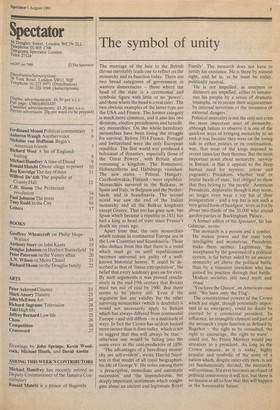The symbol of unity
The marriage of the heir to the British throne inevitably leads one to reflect on the monarchy and its function today. There are two broad categories of government in western democracies — those where the head of the state is a ceremonial and symbolic figure with little or no 'power', and those where the head is a real ruler. The two obvious examples of the latter type are the USA and France. The former category is much more common, and it also has two divisions, elective presidencies and hereditary monarchies. On the whole hereditary monarchies have been losing the struggle for survival. Before 1914 France, Portugal and Switzerland were the only European republics. The first world war produced a holocaust of dynasties, especially those of the 'Great Powers', with Britain alone remaining a kingdom. The Romanovs, Hohenzollerns and Habsburgs vanished. The new states — Poland, Hungary, Czechoslovakia, Finland — were republics. Monarchies survived in the Balkans, in Spain and Italy, in Belgium and the Netherlands, and in Scandinavia. The second world war saw the end of the Italian monarchy and all the Balkan kingdoms except Greece. That too has gone now, but Spain which became a republic in 1931 has had a king as head of state since Franco's death six years ago.
Apart from that, the only monarchies which remain in continental Europe are in the Low Countries and Scandinavia. Those who deduce from this that there is a trend which must go on until republicanism becomes universal are guilty of a wellknown historical heresy. It could be described as that of 'linear extrapolation', the belief that every tendency goes on for ever. By such arguments it was proved conclusively in the mid-19th century that Britain must run out of coal by 1900. But there seems to be plenty still. Even if the argument has any validity for the other surviving monarchies (which is doubtful) it would not necessarily apply to Britain which has always differed from continental Europe — and still differs — in a multitude of ways. In fact the Crown has seldom looked more secure than it does today, which is not to suggest that this will always be true — otherwise one would be falling into the same error as the coal-predictors of 1850.
'The advantages of a hereditary monarchy are self-evident', wrote Harold Nicolson in that model of all royal biographies, his life of George V. He notes among them 'a prescriptive, immediate and automatic succession' and 'the imponderable, but deeply important, sentiments which congregate about an ancient and legitimate Royal Family'. The monarch does not have to justify his existence. He is there by natural right, and he is, as he must be today, politically neutral..
'He is not impelled, as usurpers or dictators are impelled, either to mesmerise his people by a series of dramatic triumphs, or to secure their acquiescence by internal terrorism or the invention of external dangers.'
Political neutrality is not the only nor even the most important asset of monarchy, although failure to observe it is one of the quickest ways of bringing monarchy to an end; it was because they were on the losing side in either politics or its continuation, war, that most of the kings deposed in recent times lost their thrones. But the most important point about monarchy, anyway in Britain, is that it appeals to the deep human need for mystery, colour and pageantry. Presidents, whether 'real' or titular heads of state, feel obliged to show that they belong to 'the people'. American Presidents, deplorable though it may seem, no longer even wear a top hat at their inauguration — and a top hat is not such a very grand form of headgear, worn as it is by about two-thirds of the 20,000 who attend garden parties at Buckingham Palace.
A former editor of the Spectator, Sir Ian Gilmour, wrote: 'The monarch is a person and a symbol. He makes power and the state both intelligible and mysterious. Presidents make them neither. Legitimacy, the acceptance by the governed of a political system, is far better aided by an ancient monarchy set above the political battle than by a transient president who has gained his position through that battle. Modern societies still need myth and ritual: 'You have the Queen', an American once said, 'We have only the Flag'.
The constitutional powers of the Crown which are slight, though potentially impor tant in an emergency, could no doubt be exerted by a ceremonial president. Its influence, an intangible element and part of the monarch's triple function as defined by Bagehot — 'the right to be consulted, the right to encourage, the right to warn' — could not. No Prime Minister would pay attention to a president. As long as the Crown remains, as it is today, highly popular and symbolic of the unity of a nation which, despite inner-city riots, is not yet fundamentally divided, the monarchy will continue. If it ever becomes an object of political controversy it will not, but there is no reason at all to fear that this will happen in the foreseeable future.


































 Previous page
Previous page